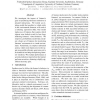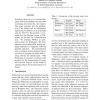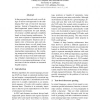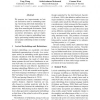ACL
2015
8 years 7 months ago
2015
We propose a technique for learning representations of parser states in transitionbased dependency parsers. Our primary innovation is a new control structure for sequence-to-seque...
ACL
2015
8 years 7 months ago
2015
Training a high-accuracy dependency parser requires a large treebank. However, these are costly and time-consuming to build. We propose a learning method that needs less data, bas...
ACL
2015
8 years 7 months ago
2015
We investigate the impact of listener’s gaze on predicting reference resolution in situated interactions. We extend an existing model that predicts to which entity in the enviro...
ACL
2015
8 years 7 months ago
2015
Incremental parsing is the task of assigning a syntactic structure to an input sentence as it unfolds word by word. Incremental parsing is more difficult than fullsentence parsin...
ACL
2015
8 years 7 months ago
2015
Central to many sentiment analysis tasks are sentiment lexicons (SLs). SLs exhibit polarity inconsistencies. Previous work studied the problem of checking the consistency of an SL...
ACL
2015
8 years 7 months ago
2015
Nowadays, there are a lot of natural language processing pipelines that are based on training data created by a few experts. This paper examines how the proliferation of the inter...
ACL
2015
8 years 7 months ago
2015
Many existing knowledge bases (KBs), including Freebase, Yago, and NELL, rely on a fixed ontology, given as an input to the system, which defines the data to be cataloged in the...
ACL
2015
8 years 7 months ago
2015
Data-driven representation learning for words is a technique of central importance in NLP. While indisputably useful as a source of features in downstream tasks, such vectors tend...
ACL
2015
8 years 7 months ago
2015
In the proposed doctoral work we will design an end-to-end approach for the challenging NLP task of text-level discourse parsing. Instead of depending on mostly hand-engineered sp...
ACL
2015
8 years 7 months ago
2015
We propose two improvements on lexical association used in embedding learning: factorizing individual dependency relations and using lexicographic knowledge from monolingual dicti...




